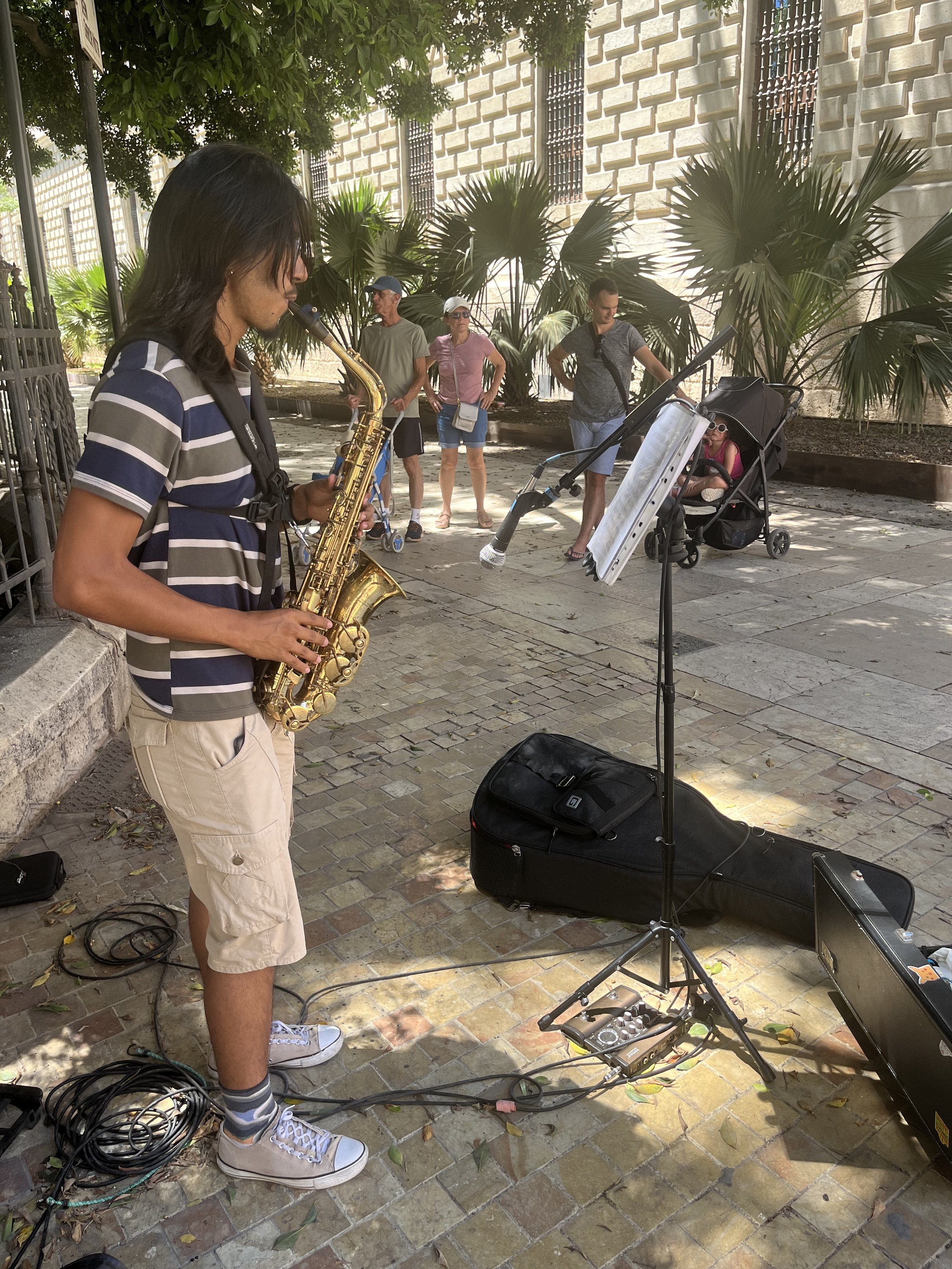
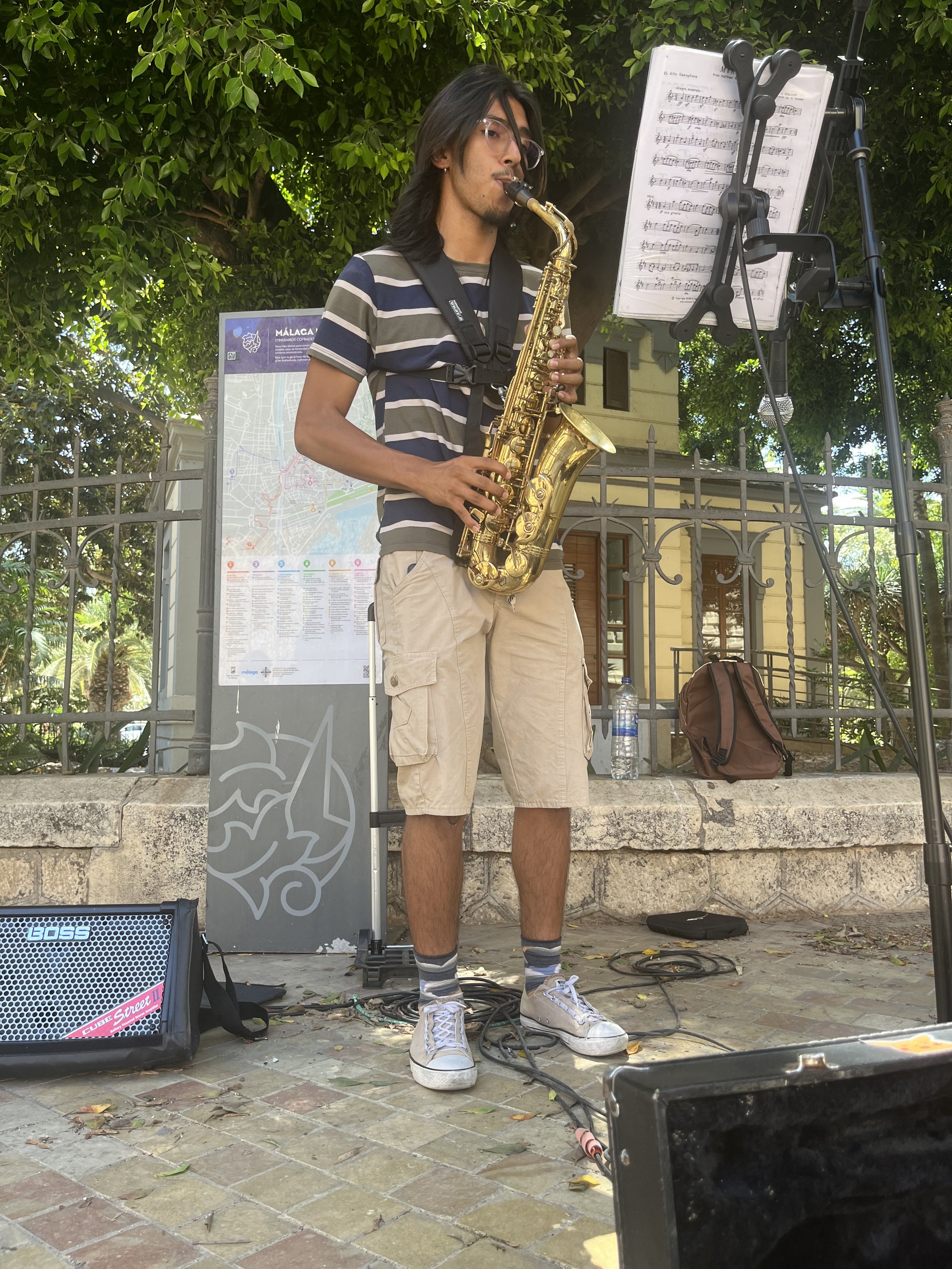

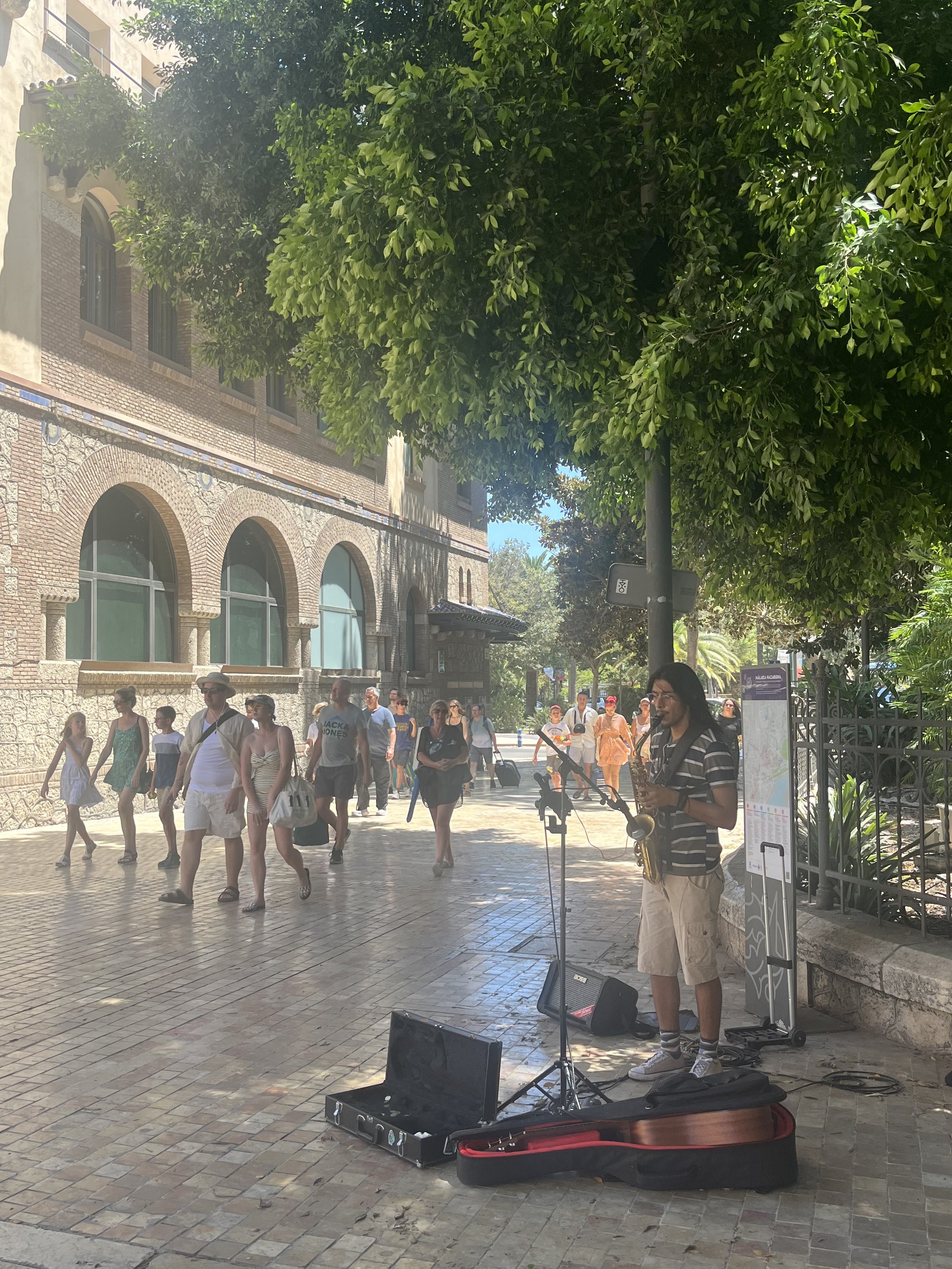
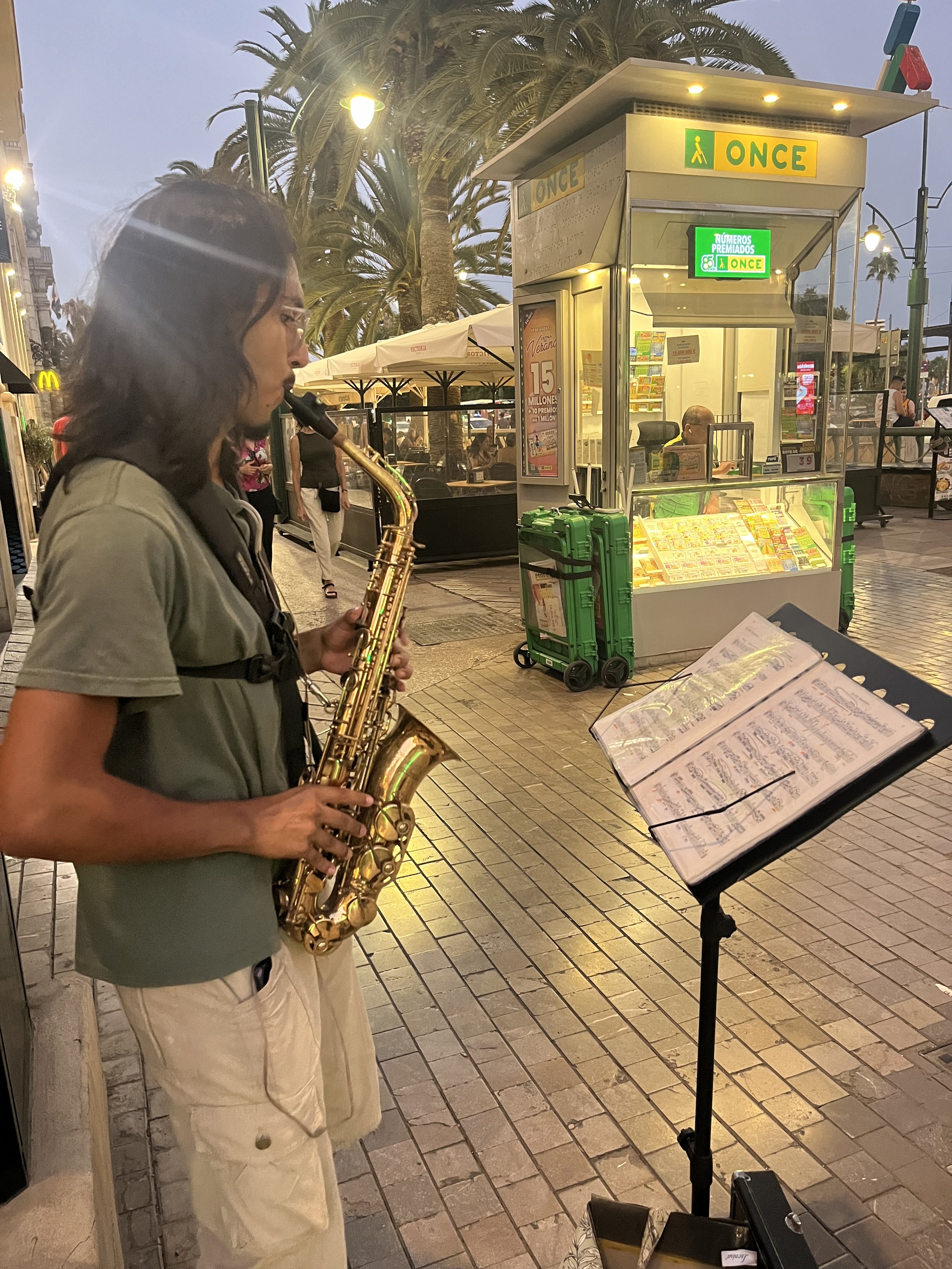
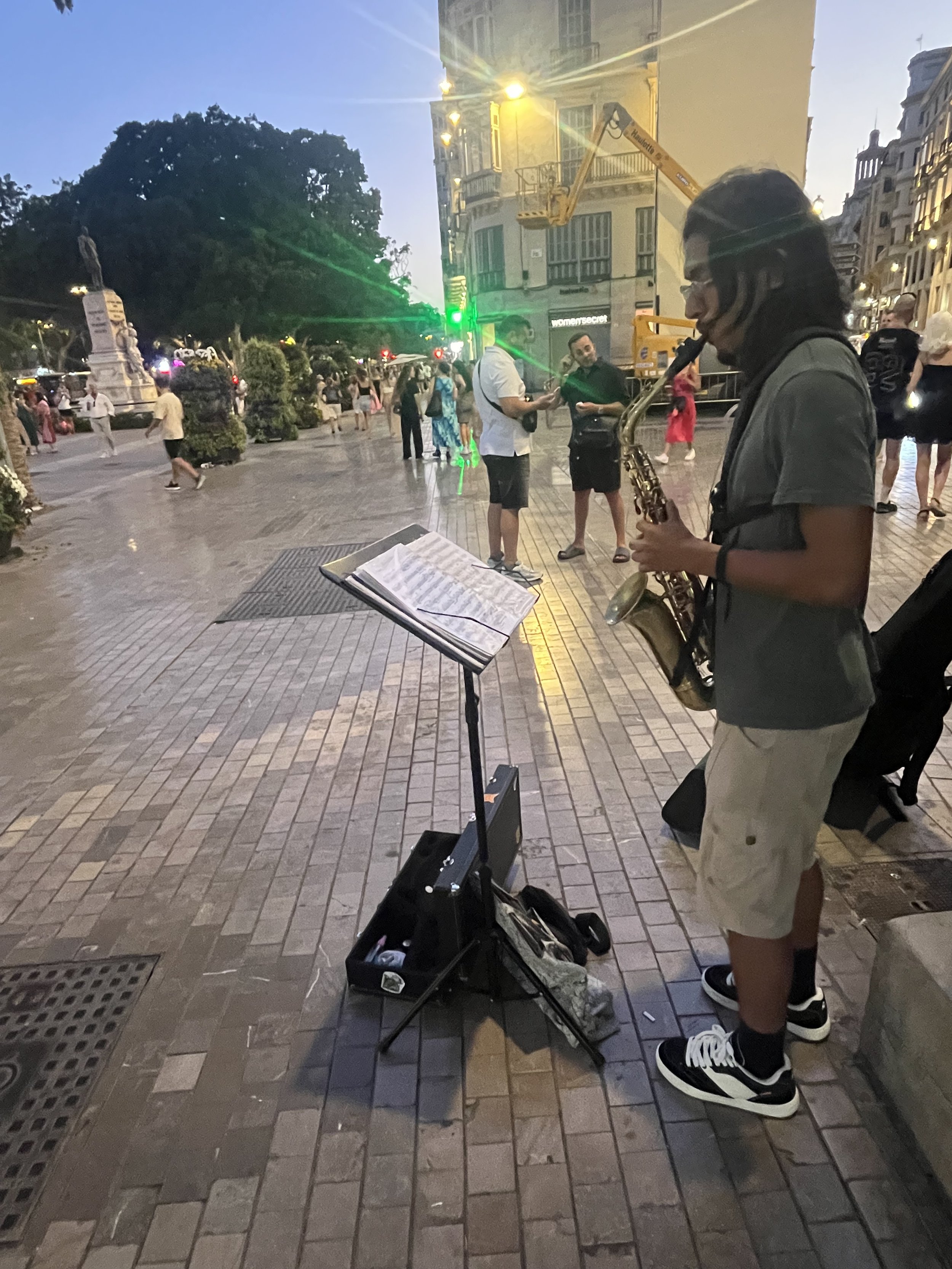

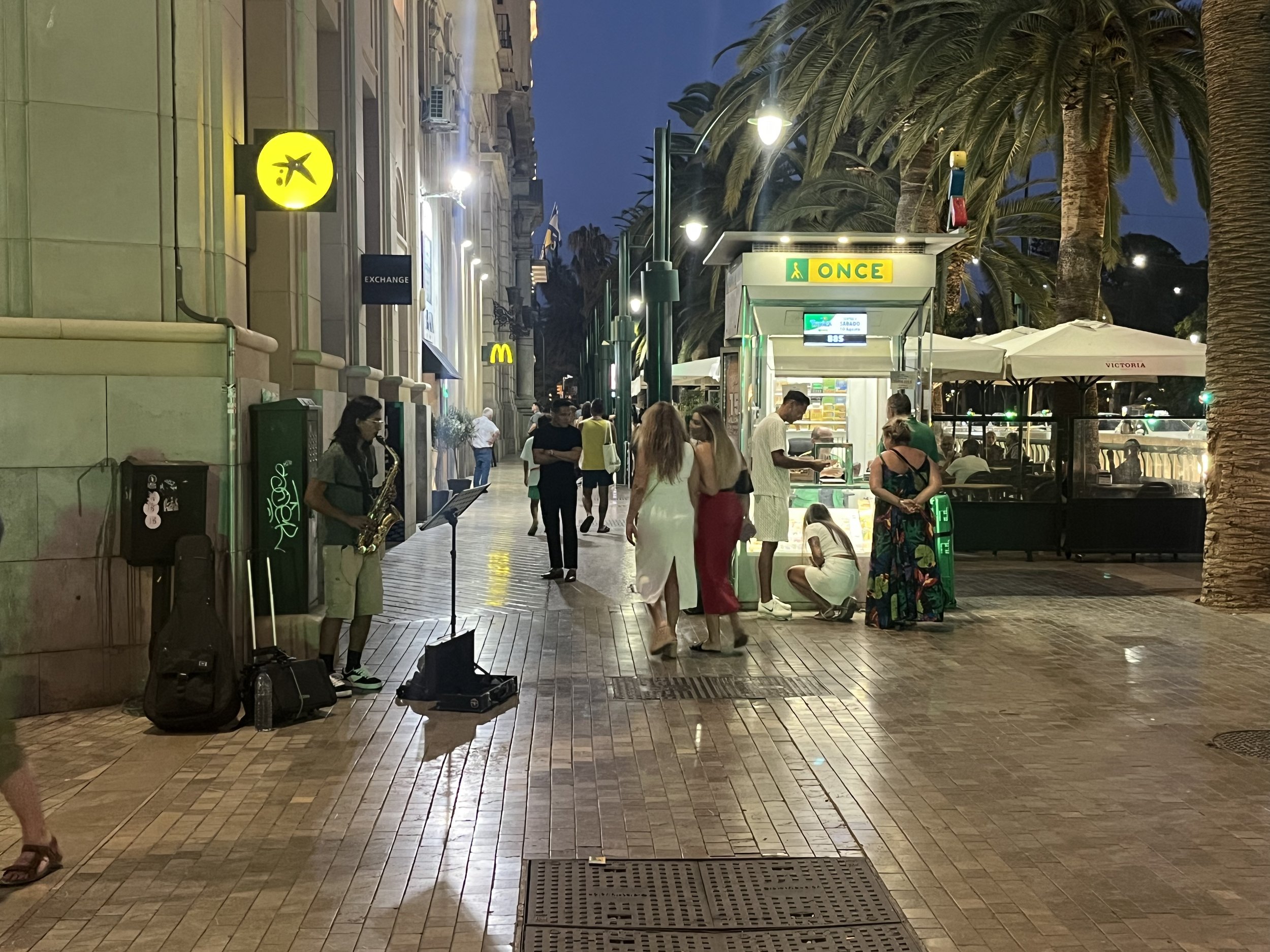
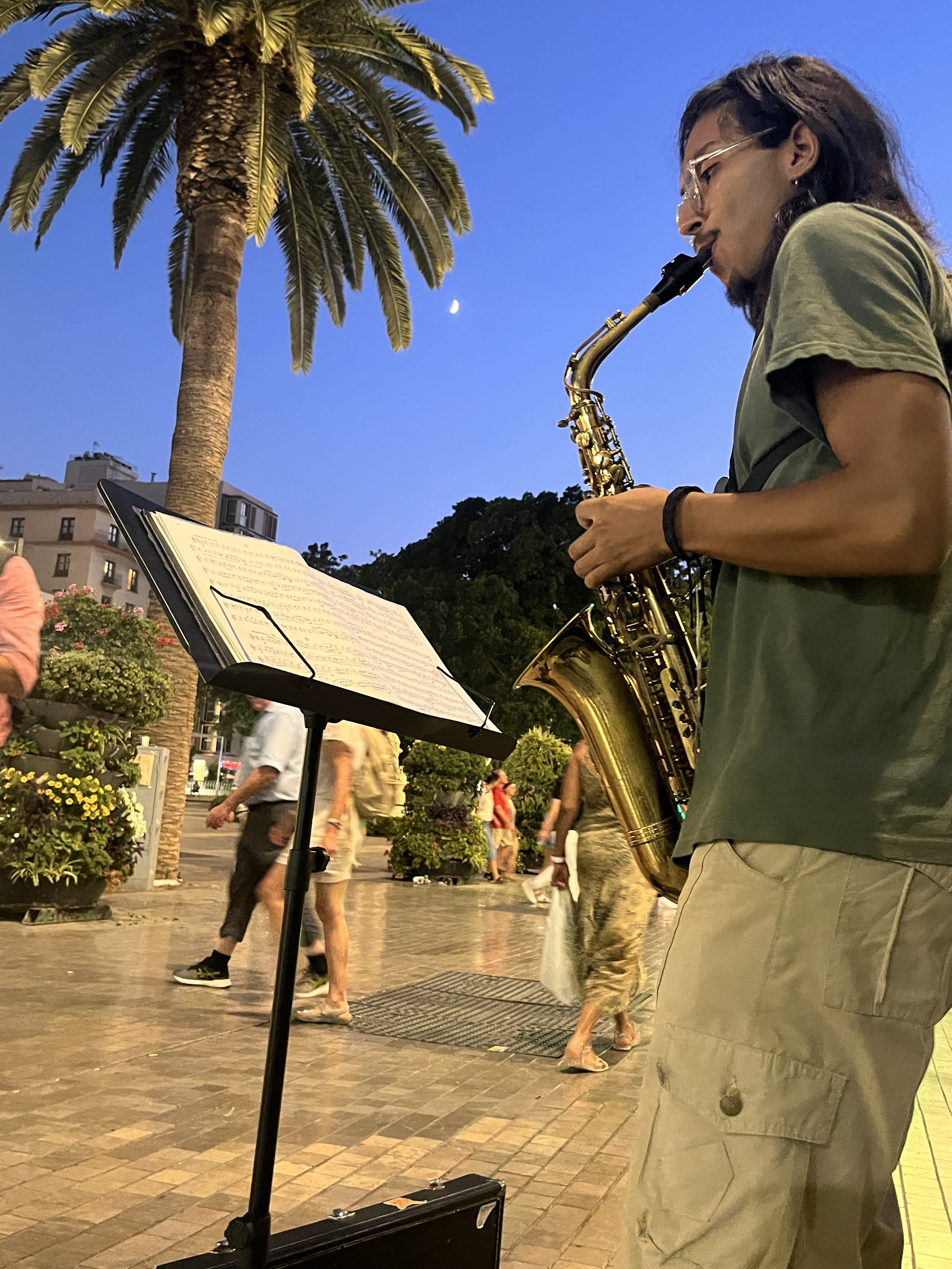


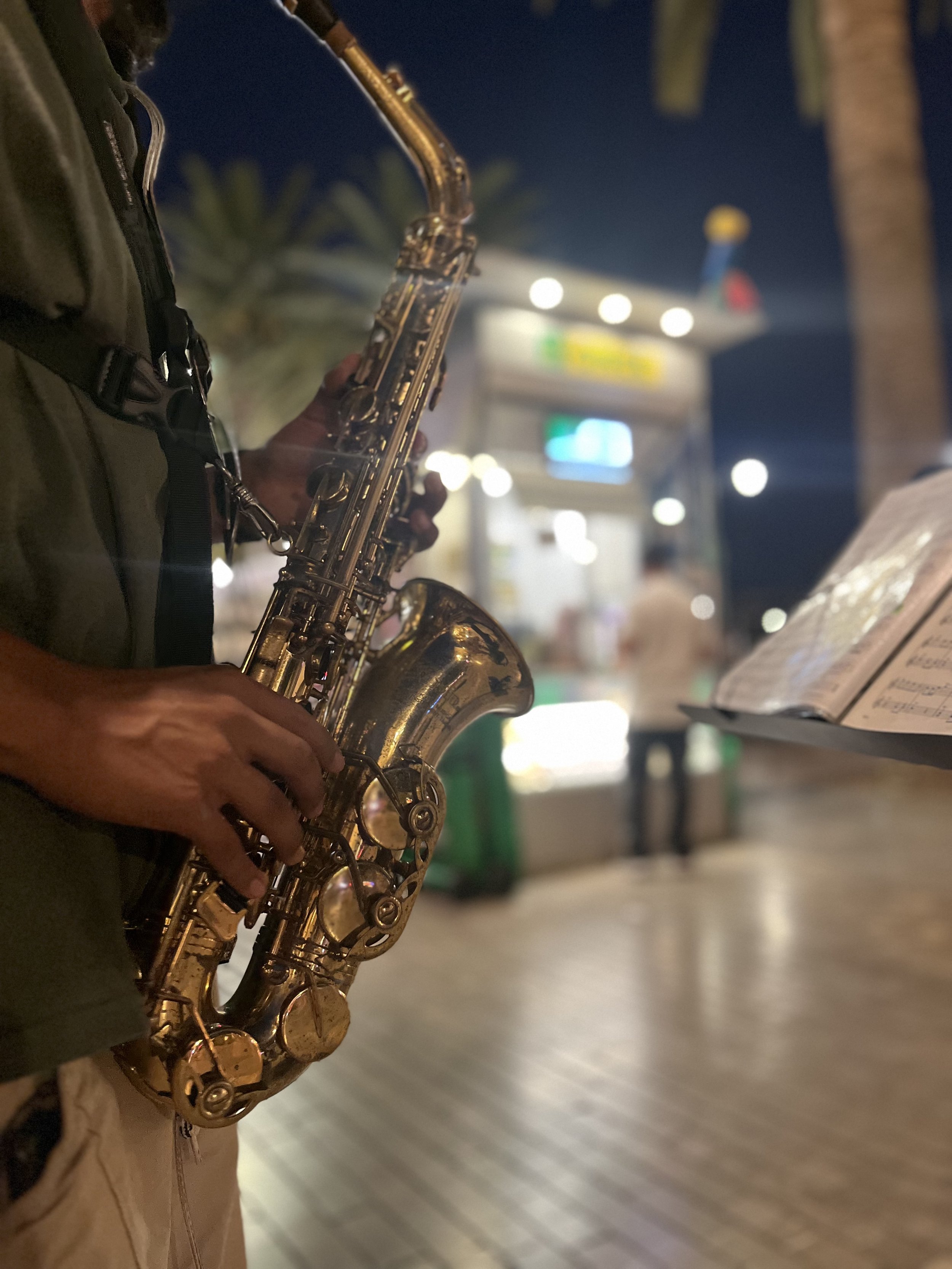
Juan Fernando Valderrama Cantor
When I first saw Juan, he was quietly standing with a small backpack and black instrument case on the promenade at the port listening to a rock trio from a careful distance. His long black hair feathered in front of his eyes and down the nape of his thin neck. Familiar with the band members, I signaled that he should approach them and see if they would let him sit in on a song or two. He seemed reluctant. When I learned he had a saxophone in the case, I encouraged him even more, but he took a step back, smiled and waved off the suggestion. It turns out that Juan’s passion is classical music, not the improvisational style needed to easily find a musical spot with a rock band. He is content for now setting up his music stand and pulling out his sax to play and practice on the streets of Málaga, where, at only 18 years old, he is by far the youngest musician trying to make music and some kind of income. His work ethic and commitment to making music his life is impressive. We played together once on the street in August 2024, where he told me that he hasn’t been warmly welcomed by a single musician here. For such an open and kind young man, that is surprising and a loss for all those who have not met him yet.
My name is Juan Fernando Valderrama Cantor. I am 18 years old. I am from Colombia. I lived in Bogotá almost all my life. I just lived three years in another part of Colombia that’s where my father is from, Granada Meta. It’s 8 hours by bus. The Colombia plains. My father grew up there, but at that moment in Colombia was so hard, his mom sent him to Bogotá to live with an aunt at maybe 12 years old. My father is a cook, but he worked in a lot of things. He studied culinary when he was 30 years old. Here in Málaga he is working in a carneceria (butcher shop). My mother is a teacher. She teaches little children, but not at this moment. I have two sisters, one older and one younger. The younger is 10 years old and the older is 27 and she is working.
My family is Christian. Right now, I am not, but I was born in a Christian family – Protestant. In the church, I saw the musicians, and I liked the music always, so at 8 years old I told my mom I wanted to play guitar. At this moment of our life, they didn’t have the money to buy me a guitar, but my grandmother bought me a small guitar for my birthday. I started playing at the church, but I was too young maybe. It was too difficult for me. I had an idea I was going to make solos and play a lot, and I couldn’t even make a D chord, so I left guitar for maybe one year. At 9 years old, I tried again. I was in a music academy after school. There I had a really bad teacher. He made me hate guitar. Too tough with us. I was there with two cousins, and we all quit. One of them took his guitar and threw it on the floor because it was horrible.
I thought music wasn’t my thing. Part of me wanted it, but part of me hated music. I think the instrument wasn’t the right instrument at this moment of my life. But then when I was in 5th grade, by school made like a symphony orchestra, and I said, “I’m going to try.”
I was 10 or 11 years old. I wanted to play trumpet, but there was a lot of children wanting to play trumpet, so I couldn’t even try. I was in a line for playing trumpet, and the saxophone teacher passed and said, “Who wants to play saxophone?”
I said, “OK, I’ll try.”
He passed the mouthpiece, and he said, “Whoever makes a sound, plays sax.”
And I made a sound and that’s how I started with the sax.
Then I moved to Granada Meta. There was less music, less teachers. There’s difficulty in Colombia playing music, and there’s more difficulty in Granada Meta because it’s a puebla. But I continued playing. I had lessons, but it was too basic. I loved, but at the same time I kind of hate because I didn’t know how to read scores. I didn’t understand, but I also wanted to play. And that was three years living there. I didn’t stop playing, but I didn’t improve. Maybe I decreased. I didn’t have a saxophone. I played with the sax of the school band. I had to go to school to play. And a teacher sold me a sax, but it wasn’t a good sax, and I didn’t know that. I started to have problems because I couldn’t make it sound how I wanted to. It was a really bad sax, but I didn’t know. I thought it was me.
I came back to Bogotá at 14 years old. When the pandemic ended, I went to an orchestra at 16 years old, but there was another problem. The conductor kind of hated sax. I didn’t know that. I just wanted to play. I had a problem with the sax. I couldn’t make it sound right. I was more classical music. He wanted to play it all good, all perfect, and I couldn’t. He treated me badly.
There was a sax solo in a song, and I had to play it. I studied a lot for that solo. It was fortissimo, and I couldn’t make a fortissimo. I was playing the solo and in the middle of it, he told the trumpet player, “Go take the scores from him because we need a sax solo, and we don’t have a sax player.” He did this in the middle when I was playing!
In this moment, I really wanted to quit music, but there was a sax teacher in the school and her name is Ximena. She made me not quit sax. I wanted to study music formally, but I didn’t know how, so I asked her.
When you want to study music in Colombia, you have to pass an exam, but you can’t pass if you don’t know anything about theory. There was a small program in the University teaching a class for those who want to pass the exam. She told me about one of these places. She helped me to find songs and make the exam. If it wasn’t for her, I wouldn’t be here. She saved me. I don’t know how, but I passed an exam for a college to learn the things to go to the university. I remember it was in 2022, there was just three spots for saxophone and there were 6 players. I got so nervous because it was my first time. It was performance and reading and theory. My performance was horrible. I remember the teacher Emmanuel, he said, “Let’s see what you did wrong. Let’s see what you did ok.” He told me, “I don’t think you are ready, but continue studying. I believe in you. I think you are going to be a big saxophonist.” He was the first person who said he believed in me.
The university opened up more places, and I made it. Universidad Distrital Francisco José de Caldas. At the first sax class, he said, “You don’t know nothing about saxophone. I will teach you, and we are going to do things right.”
He started from the beginning. This is why I say I have only one year playing sax because this is really where I start playing. Then I was at the university, and it was a wonderful experience. I started to improve and meet people who played a lot. I met prodigies. It was inspirational and depressing. Those people were very good to me. They even told me, “You don’t know a lot of things, but I can teach you what I know.”
It was wonderful being there. This was the happiest part of my life so far. I met people. I played sax. I made friends who understood me because before that at school, I always felt people didn’t understand me at all. I think artist people understand the soul and feelings, things you have to feel. I found my people. I felt I was in the right place with the right people at the right moment. It was my home, but I was still playing with the bad sax!
The name of the faculty was ASAB – Academia Superior de Artes de Bogota, the school inside the University. We call it casita. I started just one year ago in 2023.
The economic situation is very very hard in Colombia. My father did what he could do, but it was so difficult. When I said that I wanted to play music, my parents supported me, but they say, “We want you to play music, but we don’t have anything to help you, so you have to find a way to do this.”
I worked a little. I started to sell candies at the university and other things. I sold lottery tickets. I took all the money, and then I could buy a new sax. It was expensive for me but it is not an expensive alto sax. The sax cost maybe 1,600,00 pesos Colombians. It is like 400 Euros. In Colombia it’s a lot of money. It’s what you earn working one month. Then I had to earn money to fix the sax!
We wanted to leave Colombia for a long time. My parents’ dream was to give us a better future. We tried to go to Canada, but someone stole our money. It was a scam. We tried to come to Spain 4 years before. We tired a lot of times. Then in June 2023, my father said he would do it and he came by himself in October. We didn’t know when we were going to come. In February 2024, my father said that maybe we could come here now. We started to sell all we had there. I told my father, “I’m going to study music here. If you tell me that I can, I will come.”
He looked for a conservatory and he made all things for me to make the exam. So, I came here, and I made the exam, but I didn’t pass. But I will try again.
Two weeks before my dad came here, I started to go on the street to play. I remember my first time maybe October 2023. I was so so nervous. It was in the downtown of Bogotá. I was alone. I went out with my sax and my scores and no more. My father said, “If you want I will go with you.”
But I said, “No, I have to do this by my own.”
So I went. The first five or six songs, it was terrible, but I made a little bit of money. But I say, “OK, It’s not that bad. Let’s try to do it better.”
It really worked because I need money to buy things for the sax and things for university and that money helped a lot. Also, I was practicing. Playing in front of people to make people feel music, not just to play music is difficult. It really helps me a lot. I also felt at sax class I was better because I trust myself more.
When I started at the university, I wasn’t sure if it was my thing or it wasn’t. I didn’t trust me nothing. The first three saxophone classes, the teacher told me what I have to study, but sometimes I didn’t or it didn’t work. So, I remember one class he told me, “Do you really want to play sax? Because there, outside, there’s a lot of saxophone players who really want to do this and really want to be here. You are here, but you aren’t studying. So, you want or you do not want?”
I told him, “Ok, I want.”
I started to really study, and I remember one week I came with a song. I played and he said, “The notes are OK, but I don’t feel nothing. I want you to feel it.” He said, “I am going to accompany you on the piano, so play but feel it.”
So I started to play. I memorized the songs, and I had a lot of ideas in my head, but in this moment all of these things disappeared. I just heard sax and piano. There was a moment I wasn’t hearing anything. I was just lost in the music. I closed my eyes. I was playing. When I finished, I picked up my head and when I saw my teacher, he was crying. And I realized I was crying, too. It was impressive. I realized this is all I need. It was the moment when I said, “I am a saxophonist.”
Society tells you that you don’t have to feel. Just work. Just make things. Just study, but you can’t feel. I think that is the beautiful thing of playing music, that you can feel, you have to feel. If you don’t feel it, they don’t feel it. And if they don’t feel it, why are you playing?
I came to Málaga in May 2024. I didn’t pass the exam here in Málaga. I just played and they said, “See you, maybe!” I thought I was going to pass the exam. I was really prepared, and I had a lot of confidence, but maybe too much. It was 3 classical songs. It has to be 30 minutes playing music, and one of three songs had to be memorized. It was difficult but Emmanuel really helped me. He is a really wonderful teacher.
I went to the conservatory for the answer because no one called me. I didn’t know what happened. Did I pass? Didn’t I pass? I was so nervous. I realized there were 22 saxophonists taking the exam for 12 spaces. I was number 19. I passed the exam, but my score wasn’t high enough. There is another exam in May next year. I’m already studying for the exams for next year.
After that, I was talking with a teacher from the conservatory in Málaga, so I met him and told him, “I know I didn’t pass, but I don’t know what to do. I came here to play music, and now I can’t. Maybe you can help me. You can tell me a teacher that can teach me.”
He said, “I don’t know, but there is a saxophone teacher from the conservatory in Málaga that maybe can help you.”
I talked to him. His name is Juan Luis. I tell him my story and he told me, “OK, I will give you a class, just one, to evaluate you to see how you are, to see if you are ready for this or you need to study at another place before getting here.”
I had a class with him. He helped me a lot a lot. That class was so important because he taught me a lot of things in just a one hour and 30 minutes class. It was enough. He told me that I was ready for the professional conservatory, that level, which in Málaga is just below the superior university. I said, “Ok, I am not ready. I have to practice.”
Here in my house, I can not play sax because of sound, neighbors. The person who is the owner of the house says no music, so I have to play at parks to practice and study. So, I have to practice. At this moment, I start to play in the street too because I wasn’t working, and my family needed money, so what can I do? Play in the street! I started three months ago. The first place I played was on Calle Larios (the main walking street in Málaga) in Plaza de Constitution. Then the police came and told me I could not play there. They said I had to play in other places, but they didn’t tell me where. So, I played again in a different part of Calle Larios, but the police said I couldn’t play there either. After that I tried the port. It was OK, but it was difficult to get a good sound in this space. I think I could not give a good performance there, so I started to search where I could play. I found I could play where Alameda Principal and Calle Larios meet. So, I started playing there just two weeks ago. I go every night, but I have to stop a little because I have to study for the conservatory.
Let’s talk about the experience. I think it is as beautiful experience. Sometimes people don’t really care, but there are a few moments when people are dancing or when I play popular song and they like singing, they feel the music. I really like that. Two days ago, there was a child, and I was playing a waltz. The child started to dance in front of me. It was so beautiful. That day hadn’t been so good, but when that happened, I said, “Ok, that’s why I’m here.” Of course, I’m here because of money, but this is really why I play music. The most important thing of the experience is connecting with people.
Also, I think it is important that I practice, not just like practicing alone. It’s different. I have to connect with people. I think it’s something you don’t have if you don’t look for it. If you don’t go out to play music, you won’t have that never. That has been true for me. It has helped me improve a lot, maybe not only technical things, but confidence. It has been very important for me.
About the money, it helps a little in a few things. My father is the person who brings the money because he has a job, and he pays the rent and the food. I’m helping just in specific things, like today we need a little meat or milk, so I buy. My parents told me, “It’s your money. You do with that money what you want. If you want to help, that’s Ok, but if you want to spend that money on things for sax, you can do it.”
I am so lucky with my family and their support. They have no musical background, but they really love music, and they dance. Colombia is a very musical country. People dancing always. We love singing. They don’t understand classical music too much, but they come to my concerts. They come to the street to see me playing.
It is maybe a little difficult in some ways sometimes. Yesterday I was playing sax as I do every night. I was 30 minutes playing and in a moment, someone threw an egg and it hit the scores, my phone and on my pants. The music stand got bent from the impact. It was a really hard impact. My father was behind me, and he didn’t see where it came from. Another person saw the egg too but didn’t know where it came from. Ok, I’ve had this experience!
First of all, I want to study. I want to get into the university, make a career, a profession. I want to live from music, to pay my rent. Music feeds my soul, but I need money too. I need to eat! When the moment comes, it will come. I’m not forcing it, but I’m working on it. I would like to be a concertist, to give performances in theaters, with bands or orchestras as a soloist, not just playing with orchestras.
I really fell in love with classical music when I was in the university in Colombia. I told my saxophone teacher, “I don’t know if I want to play classical music or jazz.”
He told me, “OK, we are going to start with classical music. You’ll get technique, and if you want to change you can change, but I recommend you start with classical music.”
I talked to him like 5 days ago and he always tells me even now, “You are there, play music, whatever. You are not just a classical musician. You are a musician. Every experience is important. If you are sad, play sax. If you are happy, play sax.” There’s always a different way to play music. There’s always a different point of view.
In general, I practice from 4 to 6 hours every day. If I study during the day, I can’t play on the street at night. It is too much, but I hope I can study and play on the street because I need money.
The best night I have had on the street in 2 hours is 20 Euros. For me it is a lot of money. My father always told me when I only earn 5 or 6 Euros, “Ok, it is just 5 Euros, but you didn’t have them before and now you have them.” My father is very positive.
Sometimes I feel it is my fault if the people don’t feel the music because I am the player, and I have to make them feel. Also, I am trying to make them feel music, but some people do not feel it. I think this feeling is always even if you are not playing in the street, even when you are playing in a concert or when you are playing just with friends.
I play music for that person who is listening, that person who is dancing or the person who is walking past but I see they are walking to the beat of the music. It makes me feel comfortable. I try to give me best always. It’s the work of the artist even if no one cares. Sometimes that’s really hard. There’s no boss telling me I have to be at certain hours.
For a person for the first time playing in the street, I would tell them that we are doing this for the people. Sometimes there’s no people hearing, but you have to find a way to find the people. Just play. And don’t do it just because of people, do it because of you, because it’s not just playing for money. It’s playing for your soul and people’s spirit. Try to find that. Think about what you want to express and try the best to give your best.
When I was in Colombia, I had a class with some saxophonists of the national band. One day they said, “Who wants to play, come here and play.” I did this. They told me, “First of all, music. The first thing is music, always.” I was studying a piece that I couldn’t really play. I had no technique. I wanted to play that. They said, “Ok, you want to play that, make it slow. It doesn’t matter that the score says 130 beats per minute. No. First of all music, music. You have to feel it, and you have to understand it. And people have to understand what you are playing. It doesn’t matter what the score says. First of all is music and first of all is performance. You have to do the best and understand how you can do that.”